What you eat affects your health, whether you’ve sustained a traumatic brain injury or are in perfect health. But nutrition is especially important after a brain injury. Diet can be the difference between your brain getting “just enough to squeak by” vs. being powered up for healing.
Post-concussion syndrome (PCS) takes a huge toll on the brain. You might have brain fog, fatigue, difficulty concentrating, memory problems, and more. Just dealing with these symptoms is exhausting! Many patients want to improve their diet to help with symptoms and recovery — but that takes time and energy, too.
Here’s the good news: You don’t have to completely revamp your eating habits overnight. Even small improvements can have an outsized impact on your brain health and concussion recovery! It’s much better to make small, manageable improvements than to get overwhelmed and change nothing at all.
To help you do that, we’ve created this guide to post-concussion nutrition. We cover all the information you need to improve your post-injury nutrition at whatever pace works for you, including:
Healthy eating won’t make post-concussion syndrome go away. But it will give your brain a better shot at recovery and help it function as best it can.
If you have lingering symptoms from a mild traumatic brain injury (mTBI), you’re not alone. As many as 30% of mTBI patients do not recover without treatment. 95% of our patients experience statistically verified restoration of brain function after treatment at our clinic. To learn if you’re eligible for the program, schedule a consultation.
Note: Any data relating to brain function mentioned in this post is from our first generation fNCI scans. Gen 1 scans compared activation in various regions of the brain with a control database of healthy brains. Our clinic is now rolling out second-generation fNCI which looks both at the activation of individual brain regions and at the connections between brain regions. Results are interpreted and reported differently for Gen 2 than for Gen 1; reports will not look the same if you come into the clinic for treatment.
What Nutrients Your Nerves and Neurons Need (Especially After Injury)
Up to 30% of patients who suffer a mild traumatic brain injury (mTBI) have long-lasting symptoms after the injury. Those symptoms stem from dysfunctional neurovascular coupling (NVC) — the relationship between your neurons and the blood vessels that supply them. Because of dysregulated NVC, structurally intact brain regions may still struggle to function while other regions try to pick up more tasks than they should, ultimately exhausting the brain.
In addition, some people develop dysautonomia, which is the dysfunction of the autonomic nervous system. It touches almost every major organ and controls automatic processes throughout your body.
Both your brain and your autonomic nervous system (ANS) have similar nutritional requirements:
- Water.
- Protein.
- Lipids.
- Carbohydrates.
- Antioxidants, vitamins, and minerals.
- Sodium.
This food chart will help you to see what’s helpful in which ways at a glance:
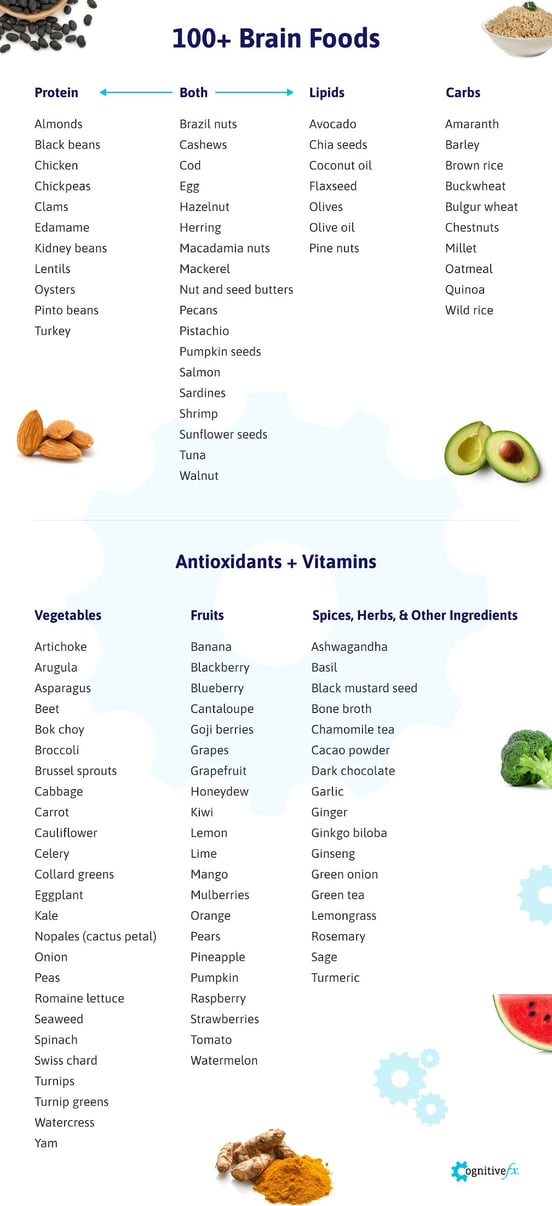
Note: Many of the foods listed for protein, lipids, and carbohydrates are also packed with vitamins.
Drink Enough Water!
Out of all the advice we share in this post, drinking enough water is the #1 most important recommendation. It’s easy to get dehydrated, especially during a pandemic when you might be wearing a mask for long hours.
The human brain is 73% water. Water helps you digest and absorb other nutrients, helps you feel focused and alert, and assists in cell growth, among many other things. Water is also important for temperature regulation and for your circulatory system, which is often negatively affected by post-concussion syndrome.
Drinking enough water can also protect against some metabolism issues and chronic diseases. Everyone needs water, but not everyone needs the same amount of water each day.
Here’s how to calculate how much water you need: Divide your weight in pounds by two. That’s approximately how many ounces of water you need to drink each day. If you’re exercising or outside in hot weather, increase accordingly.
For example, let’s say you weigh 150 lbs. That means you need 150 / 2 = 75 ounces of water today (about three 24-ounce bottles’ worth per day).
Patients with pre-existing health conditions should consult their medical provider regarding how much water they should be drinking. Some patients may need to drink less depending on their health status.
The easiest way to ensure you drink enough water is to bring water with you, wherever you go. You may have to remind yourself to drink regularly, but once you build the habit, maintaining it is easy.
Get Some Protein
Meat, fish, eggs, and beans are the best sources of protein. Nuts and seeds provide some protein as well. Protein sources provide the brain with essential amino acids used as building blocks for neurotransmitters and other important molecules.
How much protein per day you need depends on your physiology, genetics, and weight goals. Most Americans eat too little protein. Don’t worry too much about the exact amount you consume; instead, work to get a healthy variety of protein sources in your meals.
For example, if you tend to eat chicken all the time, mix in some fish, eggs, and nuts. If you’re vegan, take extra care to get enough protein from legumes and nuts. If you’re not used to eating beans, give your stomach a few days to get used to them. You may also find that some varieties of beans are easier for you to digest than others.
Most sources of protein are healthy, although some methods of preparation are better than others. For example, a grilled steak may be tasty, but the cooking process means you’ll get some trans fat and carbon from your meal. It’s OK every now and then, but eating a grilled steak every day would be problematic.
Get the Right Kinds of Lipids
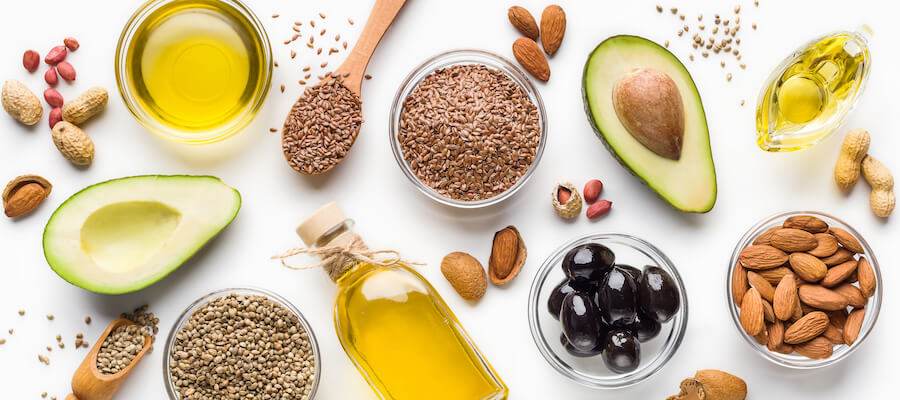
Lipids (fats and oils) are critical for a healthy nervous system and cognitive function. Some sources of healthy fats include fish (rich in omega-3 fatty acids), avocadoes, olive oil, and nuts. Consult your doctor or a licensed nutritionist who is aware of your brain injury if you plan to start a low-fat diet, because insufficient intake of healthy fats can decrease cognition.
Docosahexaenoic acid (DHA) is an omega-3 fatty acid known for its role in developing and maintaining healthy brain cells. It may have anti-inflammatory properties, which is important because many concussion patients experience increased inflammation both in their brain and throughout their bodies. While it’s best to get DHA from your diet (fish and eggs, mainly), you can take it as an algae or fish oil supplement. If you don’t want to take it all the time, consider taking it just when you’re in acute concussion recovery or during post-concussion treatment.
Note: It is possible to have too much fat in your diet. Recent research showed that obesity induced by high fat-content diets is associated with dementia, especially in females. That said, as long as you’re sticking to healthy fats and getting a balanced diet of fat, carbs, protein, and plenty of vegetables, this likely won’t be a problem.
Have Some Carbs
The debate over which carbohydrates are good for you (if any) is still raging in the scientific community. Some people recommend avoiding all carbs, even complex carbs. Others think there’s nothing wrong with a high carb diet. Based on what we know now, we recommend something in the middle: Getting your carbs mainly from fresh fruit and whole grains.
Fruit is a great source of sugar for your brain throughout the day. It’s packed with vitamins and antioxidants. Many fruits are also good sources of fiber, which may reduce brain inflammation and help with digestion. Don’t feel like you have to reach for expensive, organic blueberries — any fruit that you’ll eat is good enough. Sugar fuels healthy brain function. Just remember that you don’t need much to achieve sufficient energy production in the brain.
Complex carbohydrates from whole grains, on the other hand, can be helpful because they supply the brain with a steady supply of sugar over time, instead of a large hit all at once.
Some nutritionists advocate for variations of the ketogenic diet, which involves consuming certain ratios of fat, protein, and carbs, but with fat always being the main source of calories and carbs being the lowest. There is some evidence that it may help, but it will not work for everyone. If you decide to try it, only do so under the close supervision of a registered dietitian or properly certified nutritionist (not every state regulates nutritionists, so you may have to verify their educational background yourself).
Remember Antioxidants, Vitamins, and Minerals
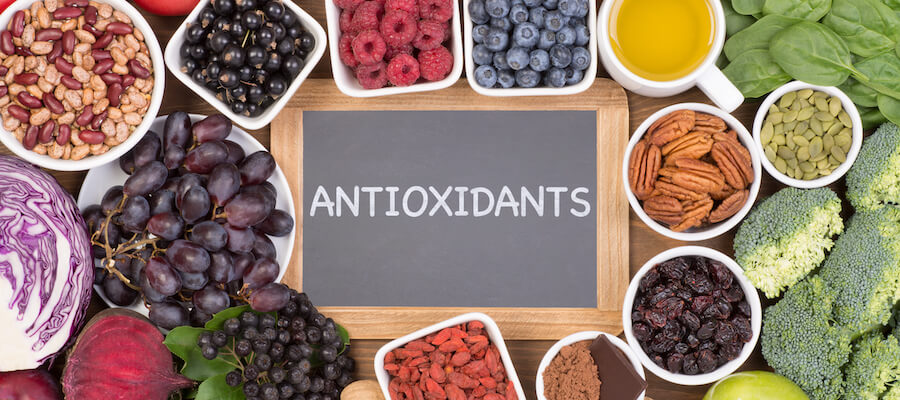
Antioxidants fight inflammation, reign in free radicals, and help your body retain and use key vitamins. Vitamins are absolutely essential micronutrients for biochemical processes throughout your body. While you can get many of them through supplementation, it’s best to get as much as you can through your diet.
Spices and fresh herbs, fruit, and vegetables are good sources of antioxidants, vitamins, and minerals. Turmeric is particularly effective; try putting it on your eggs, in sauteed zucchini, or mixed into homemade mac ‘n’ cheese. Be cautious about using pre-mixed spices, sauces, and dressings — they might contain additives like monosodium glutamate (MSG), excessive salt, and sugar.
You can have your doctor test your blood for vitamin levels. If any are low, you will likely need supplements to correct the problem. The most important vitamins for your brain health are the following:
- Magnesium.
- Zinc.
- Vitamin B12 (folate).
- Vitamin D.
- Vitamin E.
- Vitamin C.
While most people can get sufficient vitamin C from their diets, vitamin D deficiency is common. If you burn easily or can’t get in the sun often, consider a nutritional supplement.
Consume (Some) Sodium
The exact amount of sodium you need may be completely different from what your neighbor needs. Some folks need to reduce dietary sodium to keep their blood pressure down. But some brain injury patients have low or dysregulated blood pressure and could benefit from a higher sodium diet. Consult your doctor on what’s best for your health. Don’t increase or decrease sodium based on something you read online (including this post!).
Building a Healthy Meal
If you’d like a simple rule of thumb to guide your meals, you can follow the healthy plate formula:
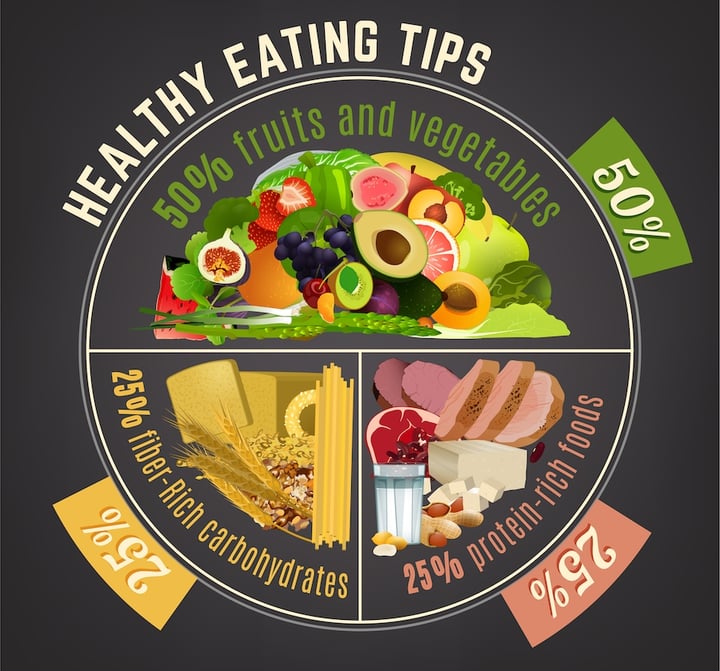
Aim for ¼ protein, ¼ healthy carbs, and ½ fruits and vegetables.
What to Avoid During Post-Concussion Recovery
To boost your brain’s recovery, we recommend avoiding four things:
- Caffeine and alcohol.
- Processed sugar.
- Artificial sweeteners.
- Fad diets.
Caffeine and alcohol: To learn how caffeine and alcohol interact with your brain, read our post about caffeine, alcohol, and post-concussion syndrome. They can cause a lot of problems for a recovering brain.
Processed sugar: You don’t have to completely eliminate processed sugar from your diet, but gradually reducing it will help your recovery. The type of sugar you consume will impact brain performance. Try replacing it with natural, low-glycemic sweeteners such as coconut sugar, agave, or honey.
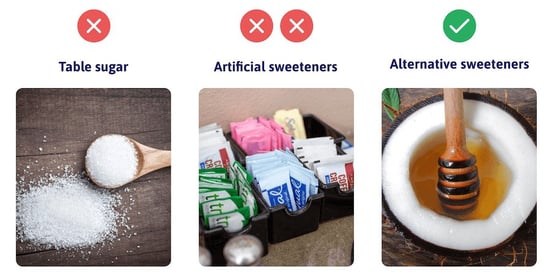 Artificial sweeteners: Do your best to cut out artificial sweeteners entirely. Substances like aspartame and saccharin trick your brain into thinking you’ve consumed calories when you haven’t. This sort of trickery is not good for people with a brain injury. If you absolutely have to have a soda, we’d rather you drink the regular, full-sugar option (as bad for you as that is) than the artificially sweetened, zero-calorie drink.
Artificial sweeteners: Do your best to cut out artificial sweeteners entirely. Substances like aspartame and saccharin trick your brain into thinking you’ve consumed calories when you haven’t. This sort of trickery is not good for people with a brain injury. If you absolutely have to have a soda, we’d rather you drink the regular, full-sugar option (as bad for you as that is) than the artificially sweetened, zero-calorie drink.
Fad diets: Be wary of any fad diets. From juice cleanses to the cabbage soup diet, there are many trends that won’t give your brain everything it needs. You shouldn’t have to choose between your weight and brain health. A diet rich in healthy sources of protein and fat, plus plenty of fruits and vegetables, can help you maintain a healthy physique while caring for your brain. If you do want to pursue weight loss goals while suffering from post-concussion symptoms, work closely with your doctor.
A Note on Food Intolerance
Some patients ask us about gluten. Should you cut it from your diet? While a gluten-free diet appears to help people with epilepsy (and is necessary if you have celiac disease), we haven’t seen any evidence that it’s good for head injury patients.
If you’ve noticed gastrointestinal symptoms (diarrhea, constipation, stomach pain, nausea, or vomiting), those could come from dysautonomia or a food intolerance (including gluten sensitivity). To determine which foods are making you feel sick, you could try a few things:
- Keep a food diary.
- Try an elimination diet (under doctor or nurse supervision).
- Get blood testing for food allergies (these are not yet highly accurate, but some patients find them helpful).
- Work with a registered dietitian.
Some of our dysautonomia patients also report heartburn. Reducing acidic foods (like tomato-based meals) may help.
Habits to Support Your Nutritional Efforts for PCS

Changing the foods you eat is just one part of the picture. Other habits and behaviors impact how well your body is able to absorb and use those nutrients. Here are a few tips to make the most of the nutrition you get after head trauma:
- Exercise regularly. This will improve your metabolism (making it easier for your body to get the nutrients it needs from each meal), encourages healthy blood flow to the brain, and can help alleviate some of your symptoms. Some people struggle with increased symptoms during or after exercise. If this is you, read our guide to safe post-concussion exercise.
- Eat smaller meals more frequently. Each large meal pulls blood to your stomach for digestion, then floods your system with nutrients. Your brain may suffer from those large swings in nutrient availability. If your autonomic nervous system is dysregulated, it might also benefit from smaller, more frequent meals. Fasting may be helpful for some people, but it is often detrimental to TBI patients (especially if you’re on medications that need to be taken with food).
- Pack healthy snacks. To keep your brain well supplied throughout the day, pack healthy snacks wherever you go. Bags of nuts and seeds, dried fruit, and fresh fruit are all helpful.
- Emphasize moderation and variety. Don’t worry about ruthlessly eliminating all sugar from your diet. For example, if you were eating two candy bars a day, try cutting back to one, and then to one every other day, and so on. Try to work different sources of good nutrients into your meal plan every week. You’re more likely to make and stick to healthy changes if you make them over time.
- Give any dietary change time. If you feel weird on Day 1, don’t take that to mean the change isn’t for you. Your stomach may need a few days to adjust to the change.
Getting Treatment for PCS? Here’s Our Meal Guide
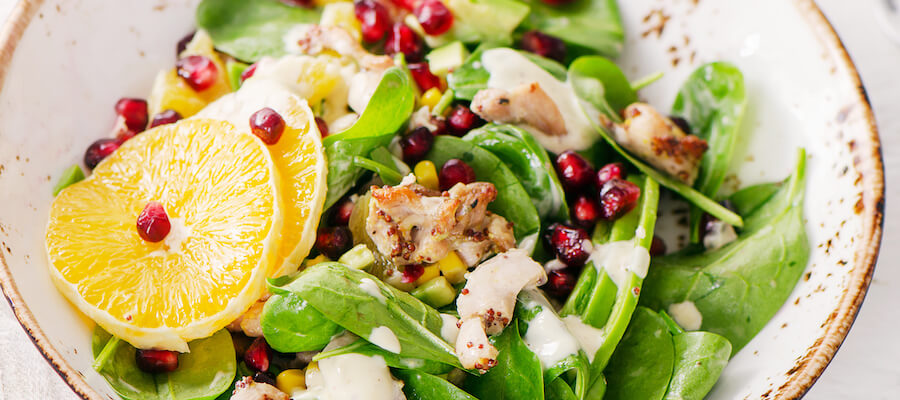
Treatment for post-concussion syndrome at CognitiveFX is intense! You’ll engage in difficult physical and cognitive exercise. Treatment pushes your brain to respond better and faster, forging healthier connections between your neurons and the blood vessels that supply them with fuel. This process (neuroplasticity) demands a lot from your brain, which means your brain will demand a lot of nutrients in response. The healthier you can eat immediately before, during, and after treatment, the better.
While home-cooked meals are always best, many patients don’t have the endurance to cook for themselves after a long day of treatment. Many of our patients travel to our clinic from all over the world; if that’s you, you might not have use of a kitchen during your stay. But if you have some kitchen supplies and want to put together your own food, here are two easy meals we recommend:
- A simple salad that includes:
- A mix of greens.
- Avocado.
- Nuts and dried fruit (for example, chopped walnuts and dried cranberries).
- One protein of your choice (fish, chicken, steak — whatever you’ve got handy).
- A simple soup that includes:
- Broth.
- Protein (chicken, beef, or shrimp).
- Canned or frozen vegetables (corn, green beans, carrots, and peas are all easy options).
- Spinach.
- Your favorite spices.
If you’re buying your meals premade, you have a number of local options in Provo:
Alternatively, you can order lunch from Kneaders or Aubergine & Company through Cognitive FX (gluten-free options available). We will provide you with a list of options before treatment so you can have lunch ready and waiting for you during your break.
If you can become a lover of dark green veggies and fish for even just three weeks (before, during, and after treatment), your brain will thank you.
Conclusion

Changing your eating habits is hard. Be realistic and don’t punish yourself for failures. Post-concussion syndrome is not easy to handle, and you may not have the energy to cook and shop for yourself all the time.
Focus on making gradual improvements, and get help and advice from friends, family, and healthcare professionals when you can. Whatever improvement you make will be so worthwhile when you feel healthier and your symptoms are reduced.
If you have lingering symptoms from a mild traumatic brain injury (mTBI), you’re not alone. As many as 30% of mTBI patients do not recover without treatment. 95% of our patients experience statistically verified restoration of brain function after treatment at our clinic. To learn if you’re eligible for the program, schedule a consultation.





 Artificial sweeteners: Do your best to cut out artificial sweeteners entirely. Substances like aspartame and saccharin
Artificial sweeteners: Do your best to cut out artificial sweeteners entirely. Substances like aspartame and saccharin 





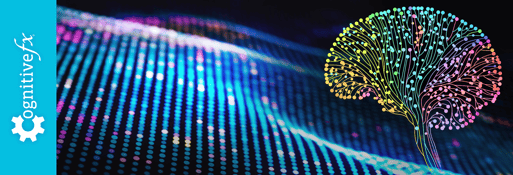
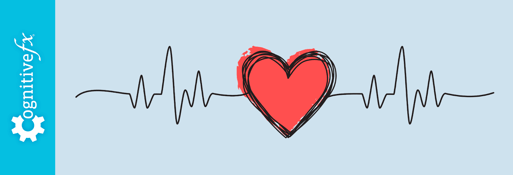
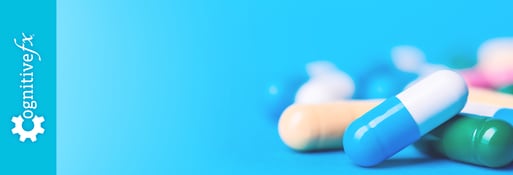
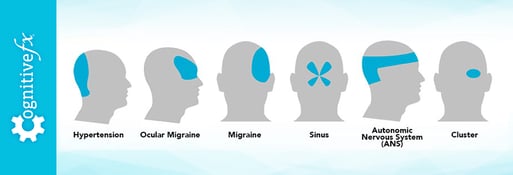
.jpg?height=175&name=Slow%20Concussion%20Recovery%20(6).jpg)